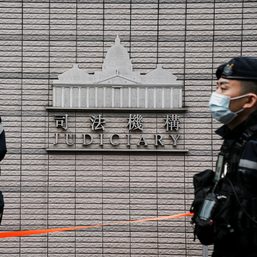SUMMARY
This is AI generated summarization, which may have errors. For context, always refer to the full article.

MANILA, Philippines – The Hong Kong government is studying the possibility of preventing migrant domestic workers in the city from changing employers within their two-year contract period.
Hong Kong recently wrapped up its eight-week public consultation on proposed revisions to employment agencies’ labor practices, which began on March 21 and ended on May 15. Changing employers within the two-year period is a practice referred to as “job-hopping,” which Hong Kong’s Labor Department (LD) is trying to restrict.
If approved, this will affect the over 191,000 Filipino domestic workers in the city – who compose more than half of the entire domestic worker population in Hong Kong as of 2021, according to Hong Kong government data.
Here are some things to know about the proposal and what it could mean to domestic workers.
What’s being proposed
In January 2017, Hong Kong’s LD promulgated the Code of Practice for Employment Agencies (CoP), which regulates the labor standards of employment agencies (EA).
The LD has several proposed revisions to the CoP that aim to improve employer-employee dynamics and welfare. These include regulations on:
- EAs keeping job seekers’ personal identification documents
- protecting job seekers’ personal information
- combatting job-hopping, which is the main issue that migrant workers’ groups are resisting
The LD proposes to require EAs to explain to job seekers that, “in accordance with the prevailing policy…an application from an FDH (foreign domestic helper) for change of employer in Hong Kong within the two-year contract period will normally not be approved.”
The exceptions that the LD provided for premature termination of contract are:
- transfer, migration, death, or financial reasons of the original employer, or
- cases where there is evidence that the FDH has been abused or exploited
A domestic worker who wants to change his or her employer must leave Hong Kong and apply for a new employment visa with the immigration department. “If there is evidence showing that an FDH job-hops, his/her employment visa application will be refused,” the proposal reads.
Why Hong Kong wants to stop job-hopping
Hong Kong authorities wish to restrict job-hopping for the following reasons:
- “Unfairness and inconvenience” to employers
- The need to protect families who paid large sums of money to employ a domestic worker, especially during the COVID-19 pandemic
“Job-hopping undermines employment relationship[s] and leads to unfairness and inconvenience to the employers. The ImmD (Immigration Department) has all along been combating such behavior proactively,” said then-security secretary and current Hong Kong Chief Executive John Lee at a Legislative Council meeting in February 2021.
How migrant worker groups have responded
Migrant workers across nationalities, as well as their supporters, have strongly rejected the proposal for the following reasons:
- The proposal is “discriminatory” against domestic workers, according to the Asian Migrants Coordinating Body (AMCB), an alliance composed of Hong Kong-based workers from the Philippines, Indonesia, Thailand, Nepal, and Sri Lanka
- It infringes on a “basic human right” of domestic workers to change their employers, according to a group of Hong Kong-based researchers, who also employ migrant domestic workers
- It allegedly violates Hong Kong’s Labor Ordinance, Employment Ordinance, as well as Hong Kong’s bill of rights and International Labor Organization’s Forced Labor Convention, which both prohibit forced labor
- Workers are unlikely to easily change employers, given its costliness
- The proposal may force domestic workers to stay in abusive situations, which are “difficult” to obtain evidence for
- Workers are used as “scapegoats” for difficulties experienced by employers during the COVID-19 pandemic
Hong Kong’s Employment Ordinance states that an employee may terminate his contract without notice or payment in lieu of notice if “he reasonably fears physical danger by violence or disease.”
Meanwhile, charity organization Mission for Migrant Workers (MFMW) said that views of job-hopping as a “trend” among domestic workers are “overstretched and unfounded.”
In the MFMW’s 2022 Service Report, the organization found that 31% of migrant domestic workers who approached them had their contracts terminated, and most of these terminations were employer-initiated. The terminations were also linked to job loss – not job change – because of the “exodus of employers and other financial difficulties.”
Cynthia Tellez, general manager of the MFMW, said in a letter to Chief Executive Lee that the weeks-long contract processing at the immigration level would cause a worker to lose the equivalent of around HK$4,730 (P33,867) and HK$7,095 (P50,800) of wages.
“This would entail being unable to send for her family support for that period and her own sustenance and accommodation while in Hong Kong. No domestic worker would willingly do this,” Tellez added.
A group of researchers, who are residents of Hong Kong and employers of migrant domestic workers, also said in a position paper the implementation of the job-hopping proposal would prolong cases of abuse against migrant domestic workers.
“While the government should take steps to ensure that local families are not overburdened, this should lead to better conditions for all, rather than scapegoating, blaming, and stereotyping those who are amongst the most vulnerable members of society,” the researchers said.
The position paper was signed by faculty and researchers at the City University of Hong Kong, Chinese University of Hong Kong, Hong Kong Baptist Univeristy, Hong Kong Polytechnic University, and some supporters. – Rappler.com
1 HKD = 7.16 PHP
Add a comment
How does this make you feel?










There are no comments yet. Add your comment to start the conversation.